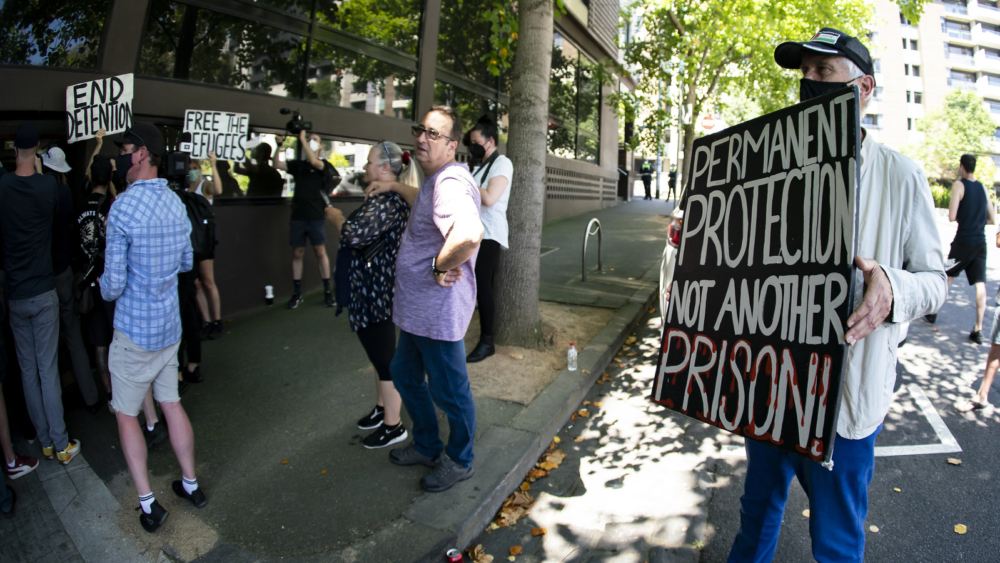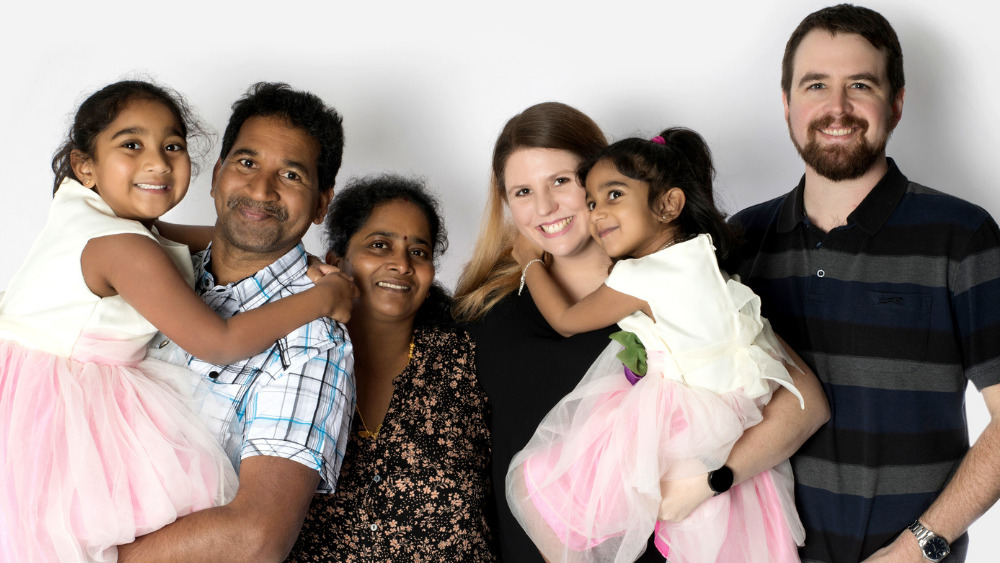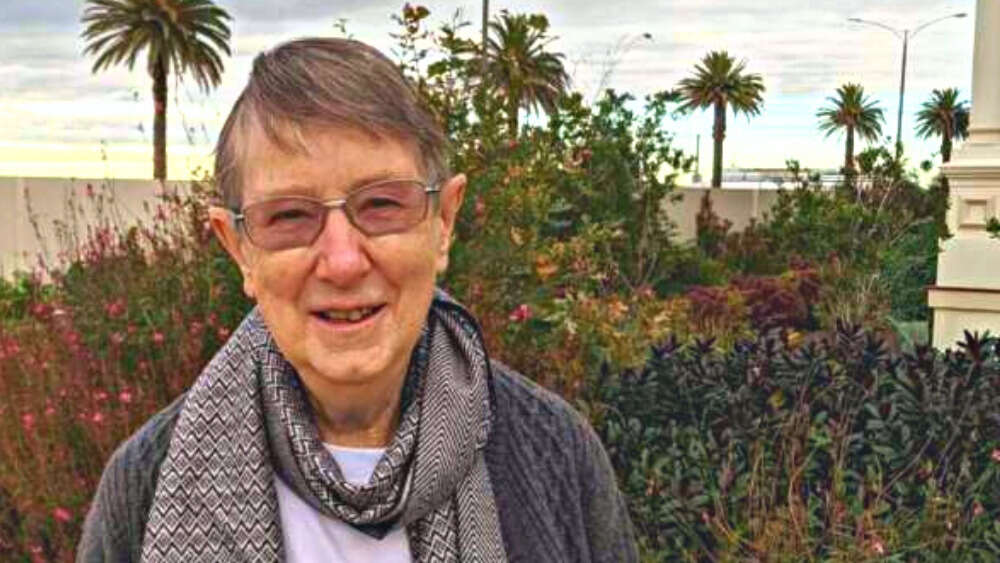Top honour to the octogenarian nun who fights for asylum-seekers
“I don’t like awards much, but I suffer it in case it does any good in terms of drawing attention to the issues,” she says gruffly.
Sister Brigid Arthur hopes she doesn’t sound “like Pollyanna” when she dares to say she senses a positive shift in attitude towards asylum-seekers in the Australian community.
The Melbourne-based Brigidine nun is referring to the excessively optimistic heroine of a classic children’s book who was determined to find something to be glad about no matter how bleak the situation.
“I think people are saying ‘Enough is enough,'” she tells Eternity while travelling on a train back to Melbourne from Colac, where she gave a talk to Year 9 students.
“I think there have been a few key public stories that have done that,” she says, referring to the outcry over the indefinite detention of asylum-seekers in the Park Hotel and the swell of public support for the Nadesalingam family to return to Biloela.

Australians protest the treatment of people seeking asylum detained at the Park Hotel in January 2022. Matt Hrkac on Flickr
She is encouraged by a suggestion that the Albanese government will allow the Nadesalingam family to remain in Biloela “with certainty”. She hopes this will lead to regularising visas for all people stuck on temporary protection visas.
With her longtime advocacy and support for refugees and asylum-seekers recognised with an AO – Officer of the Order of Australia – in the Queen’s Birthday Honours, Brigid has waited a long time for the tide to turn.
She credits “the fact that so many advocates have stuck around for a long time and kept the story before the public in some way. And the fact that if you can organise that people meet people, as soon as they put a human face, they’re likely to say, ‘Oh, well, I thought that they were all bad, but I’ve met one that I think is probably decent.’ So bit by bit, we are getting there.”
When Brigid first got involved in visiting detainees at the detention centre in Melbourne more than 20 years ago, the narrative about boat arrivals was distinctly negative.
In 2001, many people believed the Howard government ministers who said asylum-seekers on the Tampa had thrown their children overboard as a ploy to be allowed to land in Australia.
The Tampa controversy became a catalyst for Australia’s offshore processing regime and hardline border protection measures to prevent unauthorised arrivals from reaching Australia by boat.
“I think the narratives that the government created in the early 2000s with the Tampa and the children overboard [affair] created the rhetoric around ‘there were so many coming and we don’t know who they are and they could be terrorists,” Brigid says.
“And you say that it was not true – it was proven not to be true – but people believed a lot of that stuff. People still will occasionally bring up, not so much in the last few years, but prior to that, they’d say, ‘They can’t be very good people; no one throws their kids in the sea.’ I mean, no acknowledgment of the fact that not one terrorist came by boat. But that narrative did really impact the Australian consciousness.”
“I don’t like awards much, but I suffer it in case it does any good in terms of drawing attention to the issues.”
Brigid, who at 87 is widely known as “the octogenarian nun,” shows little sign of slowing down since she co-founded the Brigidine Asylum Seekers Project in 2001. She has acted as litigation guardian for children and has been a teacher and principal of several Catholic secondary colleges. She is also an author, trustee of Kildare Ministries, Life Member of Catholic Social Services Victoria, and a winner of the 2021 Pro Bono Public Impact Award.
“I don’t like awards much, but I suffer it in case it does any good in terms of drawing attention to the issues,” she says gruffly, referring to her gong in the Queen’s Birthday Honours List.
She says her interest in refugees was first sparked when she worked at a school in Melbourne’s western suburbs, which received “wave after wave of new arrivals and refugees.”
“I lived in an area that had a lot of people who came after World War II, and they were mainly widows from Eastern Europe,” she remembers.
“So the whole history of displacement fascinates me. I’m conscious of the stories of both the trauma but also the resilience of people. It’s just amazing what people go through and still survive – and, indeed, in many cases, come out the other end so strong. Yet counterbalanced against that is the cruelty and the inhumanity of what we in Australia have done to many of these people.”
After she started visiting detainees as part of a social justice group, she was struck by how the mental health of the people she met was falling apart.
“In particular, there was one young man who was talking to me about blood on the floor that wasn’t there! Then I started asking questions, and I started to think, ‘How could you get him out?’ I was fairly naive at that stage, but then ironically, it was just fortuitous that he’d come to Australia by plane and on a valid visa term as a student. I found out that by paying a bond of $3,000, you could actually get him out, so we did.
“But where I was very naive was I thought he could get out and go about his business. Well, of course, he couldn’t because he had no money. I think no right to work, but there’s certainly no ability to work anyway. So we had to get a house, and it grew from there.”
“There were no complaints, no people absconded, and yet they put an end to it all, and it was all about security.”
The Brigidine Asylum Seekers Project (BASP) went on to provide practical support such as accommodation, food, financial support, assistance with visas, family reunions, English teaching, employment and more. Until 2015 support for asylum-seekers included taking families on day trips out from detention before excursions were banned.

Sister Brigid is delighted for the Nades, Priya, Kopika and Tharnicaa Nadesalingam family (pictured here with Angela Fredericks and her husband) but points out that there are thousands of other families like them who have equally good or better cases to stay in Australia. @HometoBilo Twitter
“We could take families and individuals out on a Sunday and take them to a place. People would cook lunch and we’d have lunch. Or we’d take them to the Zoo. It was just amazing. Then all of it tightened up under the past government. None of that was possible. They tightened up every avenue of giving any alleviation to these people’s situations. But, you know, there were no complaints, no people absconded, and yet they put an end to it all, and it was all about security.”
BASP is now helping the 36 men who were released from the Park Hotel, but she says, “there’s such a degree of brokenness in the people that we locked up for so long. We have broken them.”
While she is delighted by the outpouring of sympathy for the Nadesalingam family that went back to Biloela, she points out that there are thousands of other families like them who have equally good or better cases to stay in Australia.
“We are beginning to talk about regularising the visas of all of these people who are stuck because they [the government] know it’s not serving anybody any good by having the courts clogged up by the various stages of appeal,” she says. “It can’t stay like it is forever. It simply can’t.”
While she agrees there is little alternative to turning back boats from Sri Lanka and elsewhere at the moment, she believes the government should show there is a valid way to apply for settlement and take a fair share of people.
“If it could be global or certainly a regional agreement, then we’ve got to say, ‘Well, we’re not going to be able to take everybody who wants to set out, but what we can do is take a sizeable number of people who are fleeing from either persecution or famine or climate change. It’s got to be on some kind of rational and reasonable and humane basis so that everybody can see why we are doing what we’re doing.”
“You keep on working to get more and more of the success stories.”
Asked what keeps her going each day, her first response is “stubbornness!”. Then she adds: “The government has done the worst things that they could imagine to people. And those of us who believe that that’s the worst thing and it’s cruel and uncalled for and awful should never give up on calling it out and doing what we can to alleviate suffering.
“The other thing is that I work with amazing people and they’re really good fun. People think if you’re working on something that’s fairly desperate that it must be gloomy every day. We have lots and lots of laughs – not about the issue, but about just life in general.”
And while the success stories are not as numerous as they would like, “we get enough to know that it’s possible and you have call for celebration and rejoicing. And so you keep on working to get more and more of the success stories.”
Asked if she draws strength from her faith, Brigid acknowledges that she does rely on the revolutionary teachings of Jesus in the Scriptures.
“So many Christian people think that it’s a recipe that furthers the status quo and you don’t have to do anything much except toe the line. Well, nothing could be further from the truth from a reading of the Jesus story. The undesirables were the people that he mainly talked about and told parables about. His message was very revolutionary.”
Email This Story
Why not send this to a friend?


